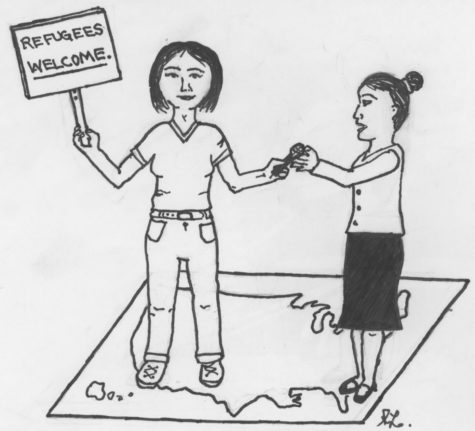Give your enemy a microphone or suffer the consequences

It could have been me.
That chilling thought sent a jolt through my body as I read through the news report. I saw a picture of her smiling face: Heather Heyer, the 32-year-old woman who was run over by a Nazi sympathizer while peacefully protesting against white supremacy in Charlottesville.
Shakily, I set my phone down as I attempted to process what had happened. What kind of despicable human being found it acceptable to take a peaceful protester’s life away under any circumstances? I had openly proclaimed my opinions denouncing sexism and racism at school and online. Would I still be safe in expressing these beliefs?
As I looked back at the article, I recognized the fire in her eyes and the wit radiating from her soft smile. Heyer’s face morphed into mine. Charlottesville may be 570 miles away from the North Shore, but a similar violent act could have happened here, like at the demonstration I attended at O’Hare International Airport, protesting the travel ban.
I’m not the only one in the Glenbrook North community who feels strongly about social justice. In late January this year, several of my friends ventured out to Washington, D.C. to protest against President Donald Trump’s executive order dubbed the “Muslim ban.” What was keeping them safe from being the victim of a tragic hate crime? Truly, nothing was protecting them from a lunatic deciding to drive a car into a crowd besides luck.
It could have been them. It could have been anyone.
We see this opposition to expression not only through physical violence, but also through verbal attacks. I’m reminded of the time when a student was brave enough to express her contrary beliefs. She was met with a cacophony of angry disagreements. One person called her a “conservative idiot.” After that incident, she seldom spoke in political discussions, most likely afraid of how she’d be treated if she voiced her opinions again.
Inside and outside of the classroom, respectful debates regarding important issues are becoming a rarity. In their place is not only physical violence, but also demeaning comments. Although the new Open Forum club at GBN aims to foster peaceful political discussion, we still have a long way to go in achieving civil discussions.
Ignoring hate crimes, like the murder of Heather Heyer, further polarizes people with beliefs that do not fall into the majority. We must reconcile and lend a microphone to our enemies, as failing to listen to more reasonable disagreements leads to the extreme: a fate like Heyer’s.
After all, it could be you.

